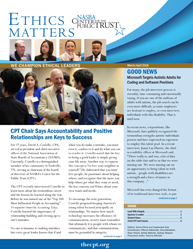CPT Chair Says Accountability and Positive Relationships are Keys to Success (March/April)
Ethics Matters
March – April 2018
For 17 years, David A. Costello, CPA, served as president and chief executive officer of the National Association of State Boards of Accountancy (NASBA). Currently, Costello is a distinguished member of his community in Nashville, TN, serving as chairman of the board of directors of NASBA’s Center for the Public Trust (CPT).
The CPT recently interviewed Costello to learn more about his tremendous career and the lessons he learned along the way. Before he was named one of the “Top 100 Most Influential People in Accounting” 15 separate times by Accounting Today, Costello learned the importance of relationship building and owning-up to one’s mistakes.
No one is immune to making mistakes, but every great leader knows that if and when you do make a mistake, you must own it, confess to it and do what you can to resolve it. Costello noted that the key to being a good leader is simply giving your life away. Another way to express this concept is “to love your neighbor as yourself.” He elaborated that you must love people, be passionate about helping others, and recognize that the more you help others get what they want or need, the less concern you’ll have about your own wants and needs.
To encourage the next generation, Costello proposed keeping America’s young talent focused principally on relationships. No matter how much technology increases the efficiency of communication, society must remember that ultimately it is people with whom we communicate, and that communication must be grounded in integrity.
For an even greater understanding of leadership principles, Costello recommends reading Team of Rivals, the Political Genius of Abraham Lincoln (Doris Kearns Goodwin), 7 Habits of Highly Effective People (Stephen Covey) and Good to Great (Jim Collins), and enrolling in the CPT’s ethical leadership courses, because the responsibility for maintaining an ethical culture begins at the top, but requires participation from team members at all levels of the organization.

